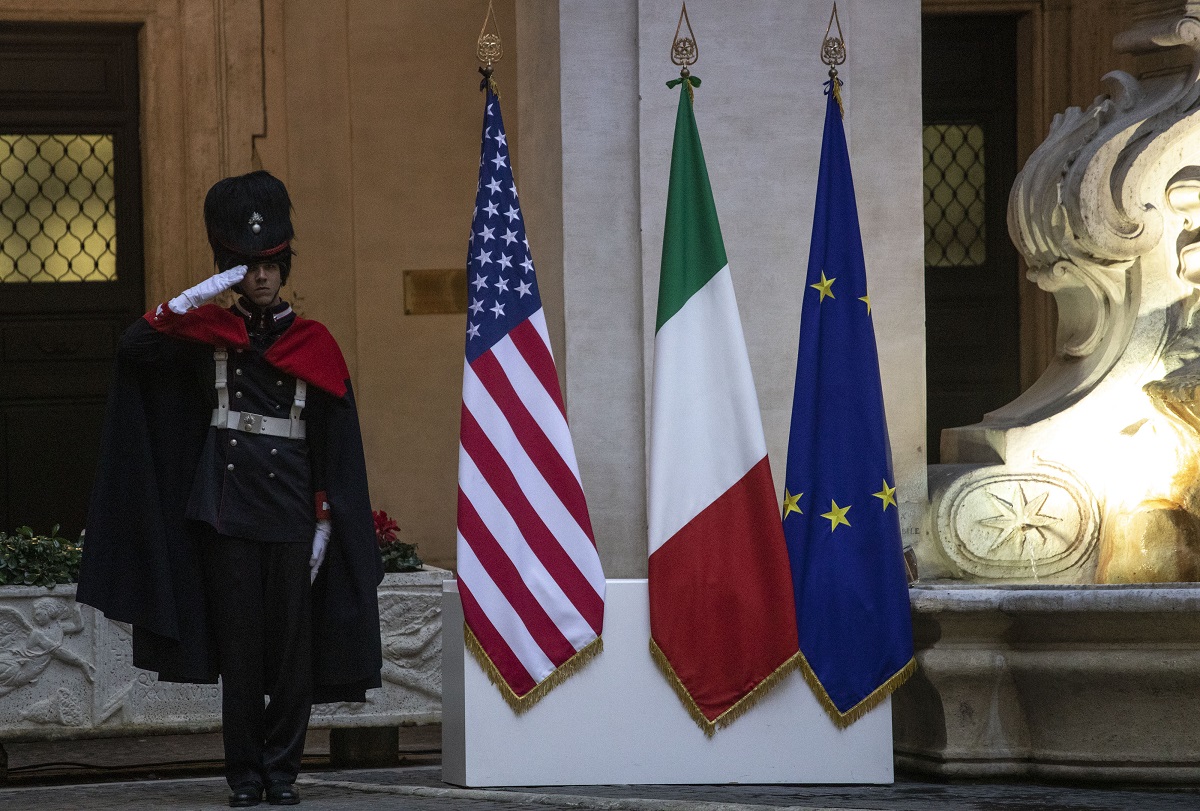The minister of Defence, Lorenzo Guerini, the chairman of the EU military committee, Claudio Graziano, and the president of Leonardo, Luciano Carta, clarified Italy’s position on EU Defence: it has to strengthen Nato’s European pillar. They convened with experts, decision makers and the US vice-ambassador
On Wednesday, an online panel at the Center for American Studies in Rome featured key decision makers, military experts, and some high-level diplomats. One simple aim: discussing Italy’s position on Nato and European defence.
The stage was set by the recent mediatic debate between French President Emmanuel Macron and German defence minister Annegret Kramp-Karrenbauer, with the former arguing for a radical interpretation of European “strategic autonomy” – i.e. complete military independence from the US – and the latter calling that idea “an illusion”.
As it turns out, there is something akin to a general agreement. The panellists agreed that European countries should reinforce their defence capabilities to support Nato’s European pillar, and that independence from the US on military matters is neither practical, nor desirable.
Both the defence minister Lorenzo Guerini and the former ambassador to the US Ferdinando Salleo agreed that this debate was nonetheless timely and positive. Mr Guerini specified that European strategic autonomy – a term that’s being thrown around a lot in Brussels lately – doesn’t mean indulging in identity impulses, but rather building the capacity to prop up Western security, which is in turn “founded on the Atlantic Pact”.
Giancarlo Giorgetti, second-in-command and foreign policy delegate of the leading opposition party, the League, then made his point. All is good and well, but the road for a real European capacity to intervene abroad is still long. Nonetheless, he believed it necessary to support it through additional funds and commitments, with the overarching aim of strengthening Nato. “The world is divided between who believes in democracy and freedom, and who thinks they are optional”, quipped Mr Giorgetti, while making the case for the Atlantic Alliance and delivering a thinly veiled jab to the rise of Chinese autocracy.
Then general Claudio Graziano, who is president of the EU’s military committee, argued in favour of increased synergy between the bloc’s and the US’ forces. He talked of “strengthening our collaboration, which has excellent premises, but needs more dynamism in developing tactics and operative capability.” Benedetta Berti, who oversees NATO’s political planning, agreed, but added that “we cannot allow duplication, competition, or two different lists of requirements” between the EU and the US.
This stance impacts the industrial field, posited general Luciano Carta, president of Leonardo: it entails industrial collaboration between the two powers, and governmental support for it. The general voiced his worries regarding a bill being discussed in Capitol Hill which would dramatically inflate the Department of Defense’s “Buy American” policy, at the expense of foreign companies.
Then Guido Crosetto, president of the Italian federation representing aerospace, security, and defence industries (AIAD), hit the brakes. Talking about European defence, he remarked the difference between desire and reality, as the EU struggles to create common objectives due to differing interests (as shown with Libya, Turkey, the Mediterranean, and bilateral programmes such as the Franco-German military alliance).
European defence is “necessary for the very survival of EU member states,” argued Mr Crosetto, but it’s impossible to reach it without shared intentions and with fierce industrial competition. The idea that sovereignty is national remains in the EU. Thus, the best way forward is exercising “Euro-Atlanticism” at the national level in critical choices such as 5G.
Finally, the US chimed in through vice-ambassador Thomas D. Smitham, who declared that Washington sees Natoand the EU essential to maintain European peace and stability. A “strong transatlantic relationship” is necessary, he said, especially in facing today’s complex reality, riddled with the pandemic, hybrid warfare (which includes disinformation) and China’s rise. And yes, collaboration also entails European openness to American industries, as “we cannot have differing industrial policies”.








